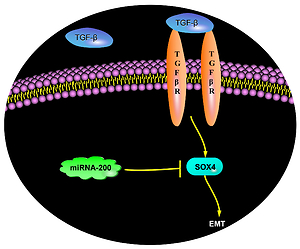Current issue
Archive
Manuscripts accepted
About the Journal
Editorial office
Editorial board
Section Editors
Abstracting and indexing
Subscription
Contact
Ethical standards and procedures
Most read articles
Instructions for authors
Article Processing Charge (APC)
Regulations of paying article processing charge (APC)
RESEARCH PAPER
MicroRNA-200a inhibits TGF-β-induced epithelial-mesenchymal transition in human ovarian carcinoma cells by downregulating SOX4 expression
1
The First People’s Hospital of Yongkang, China
2
Guang Fu Hospital of Jinhua, China
3
Jinhua Municipal Central Hospital, China
Submission date: 2021-02-08
Final revision date: 2021-05-07
Acceptance date: 2021-06-17
Online publication date: 2021-07-02
KEYWORDS
TOPICS
ABSTRACT
Introduction:
The microRNA-200 (miR-200) family and sex-determining region Y-box 4 (SOX4) could regulate epithelial-mesenchymal transition (EMT), which is important for the process of tumor pathology. This study explored the association of miR-200a with SOX4 in transforming growth factor (TGF)-β-induced EMT of ovarian carcinoma (OC) cells.
Material and methods:
For the in vitro experiments, human CO cells subjected to TGF-β were used to induce EMT; the activity of miR-200a was selectively inhibited or overexpressed by miR-200a inhibitor and mimics, respectively. Small interfering RNAs against SOX4 (si-SOX4) were used to inhibit SOX4 expression in human OC cell lines.
Results:
Decreased miR-200a and increased SOX4 levels were detected in patients with OC and these changes were closely related to the International Federation of Gynaecology and Obstetrics stage, ovarian tumor biomarker CA125 level, lymph node status and tumor size. The TGF-β-treated cells increased the miR-200a level, decreased the SOX4 level and prompted EMT properties, including a reduction in epithelial marker (E-cadherin), induction of interstitial markers (vimentin and n-cadherin), and enhancement of proliferation, migration and invasion. The OC cells were transduced with miR-200a mimic and the overexpression cells were subsequently treated with TGF-β; decreased SOX4 expression and EMT properties were detected. Also, in miR-200a inhibited cells, TGF-β increased SOX4 expression and EMT properties. Moreover, SOX4 silencing weakened the effect of the miR-200a inhibitor.
Conclusions:
Overall, these results provide a link between miR-200a and SOX4 in OC pathogenesis and indicate that miRNA-200a inhibits EMT by downregulating SOX4 expression in human OC cells.
The microRNA-200 (miR-200) family and sex-determining region Y-box 4 (SOX4) could regulate epithelial-mesenchymal transition (EMT), which is important for the process of tumor pathology. This study explored the association of miR-200a with SOX4 in transforming growth factor (TGF)-β-induced EMT of ovarian carcinoma (OC) cells.
Material and methods:
For the in vitro experiments, human CO cells subjected to TGF-β were used to induce EMT; the activity of miR-200a was selectively inhibited or overexpressed by miR-200a inhibitor and mimics, respectively. Small interfering RNAs against SOX4 (si-SOX4) were used to inhibit SOX4 expression in human OC cell lines.
Results:
Decreased miR-200a and increased SOX4 levels were detected in patients with OC and these changes were closely related to the International Federation of Gynaecology and Obstetrics stage, ovarian tumor biomarker CA125 level, lymph node status and tumor size. The TGF-β-treated cells increased the miR-200a level, decreased the SOX4 level and prompted EMT properties, including a reduction in epithelial marker (E-cadherin), induction of interstitial markers (vimentin and n-cadherin), and enhancement of proliferation, migration and invasion. The OC cells were transduced with miR-200a mimic and the overexpression cells were subsequently treated with TGF-β; decreased SOX4 expression and EMT properties were detected. Also, in miR-200a inhibited cells, TGF-β increased SOX4 expression and EMT properties. Moreover, SOX4 silencing weakened the effect of the miR-200a inhibitor.
Conclusions:
Overall, these results provide a link between miR-200a and SOX4 in OC pathogenesis and indicate that miRNA-200a inhibits EMT by downregulating SOX4 expression in human OC cells.
We process personal data collected when visiting the website. The function of obtaining information about users and their behavior is carried out by voluntarily entered information in forms and saving cookies in end devices. Data, including cookies, are used to provide services, improve the user experience and to analyze the traffic in accordance with the Privacy policy. Data are also collected and processed by Google Analytics tool (more).
You can change cookies settings in your browser. Restricted use of cookies in the browser configuration may affect some functionalities of the website.
You can change cookies settings in your browser. Restricted use of cookies in the browser configuration may affect some functionalities of the website.



